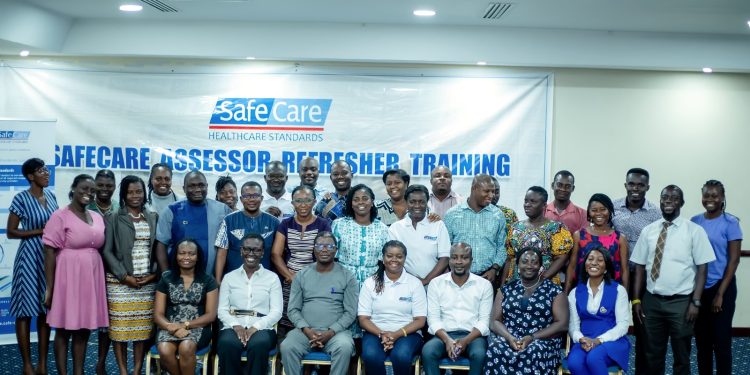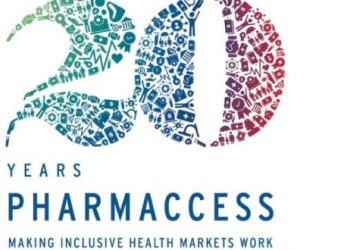In the realm of healthcare, ensuring excellence is not just a goal; it’s a necessity. That’s where the SafeCare Assessor Training Program steps in, a pioneering initiative by PharmAccess that has been reshaping the landscape of healthcare quality in Ghana since its inception in 2014.
This groundbreaking program equips healthcare professionals with the knowledge, skills, and tools necessary to implement the internationally recognized SafeCare Standards and drive the wheels of quality improvement (QI) methodology. Through comprehensive assessments and ratings, these trained assessors identify quality gaps and areas needing improvement and support facilities in implementing improvement activities or programs. As a result, participating healthcare providers can elevate their standards of care and continuously establish themselves as trusted providers of high-quality care.
A Journey of Impact
The program initially trained Technical Quality Officers from Marie Stopes International Ghana, who successfully utilized the SafeCare Standards and Methodology to enhance services within the social franchise network. Since then, healthcare professionals from partner organizations such as Sanford World Clinic, University of Ghana Medical Center, New Cristal Health Services, (Care Point) Africa Health Holdings, and the Christian Health Association of Ghana have also undergone training as assessors. These assessors are spread across all the regions in Ghana, collectively supporting about 700 healthcare facilities that see over seven million people annually.
“It is an eye opener for us as CHAG…..we didn’t know much as to what was happening in our facilities. Now we know the simple but important things we can do to improve the quality of healthcare” One assessor with the Christian Health Association of Ghana noted.
The SafeCare Assessor Training Program follows a structured approach consisting of three phases after a standardized and rigorous selection of professionals. In the first phase, trainee assessors establish a solid foundation through intensive face-to-face sessions that delve into theoretical concepts related to healthcare quality management, standards, and tools for improvement.
The second phase focuses on applying this knowledge in real-healthcare facility assessments under the guidance of a mentor, with continuous feedback and a post-training test.
The final phase aims to solidify expertise by conducting independent but remotely supported assessments in at least five healthcare facilities. Successful completion marks their journey with the esteemed title of a licensed SafeCare assessor and a QI facilitator. Each year, a qualified SafeCare assessor must attend a refresher training and conduct at least five facility assessments to maintain the SafeCare assessor license.
This immersive training experience equips assessors with a comprehensive understanding of the SafeCare Standards and Methodology, as well as essential soft skills required for effective assessments, instructive reporting, and impactful feedback. By revolutionizing their approach to assessing quality healthcare service delivery, these assessors can identify areas for improvement and develop quality improvement plans (QIPs) to support healthcare facilities on their quality improvement journeys.
Elevating Excellence, Transforming Care
Overall, the SafeCare assessor training program is transforming the healthcare landscape in Ghana by empowering assessors to drive quality improvement initiatives. With about 700 healthcare facilities currently benefiting from comprehensive assessments and QI facilitation, the program has helped the facilities to successfully identify areas for improvement and implement tailored initiatives for improvement.
The impact, according to the assessors and providers, has been remarkable, with a reduction in adverse events, increased patient satisfaction, and significant operational and business performance. These achievements highlight the program’s commitment to enhancing the quality of care and driving positive change in Ghana’s healthcare system.
Beyond Assessors’ ability to identify areas for improvement and support the implementation of improvement initiatives, they have gained holistic expertise in healthcare management. This broader perspective has enhanced their ability to assess and evaluate healthcare facilities, leading them to revise their individual work approaches and collaborate more effectively with their teams.
A Tapestry of Positive Change
The training has empowered assessors to advocate for resources and improvements in healthcare facilities. Through their expertise and data-driven assessment reports, certified assessors have played a vital role in driving tangible outcomes and guiding facilities toward value-based care. This data-driven advocacy has revolutionized resource allocation and improvement efforts, resulting in notable improvements in infrastructure, equipment, staffing, operational and care processes.
Certified assessors have become invaluable resources for healthcare facilities, helping to institutionalize quality improvement in our healthcare system aligned with international standards. This shift towards value-based care ensures that patients receive high-quality, evidence-based care focused on improving health outcomes.
Moreover, the program has empowered assessors to take on leadership roles within their facilities and the broader organizations. They have become advocates for change, leading initiatives and reforms that improve the quality of care. As a result, patients receive better quality of care that meets international standards.
Fostering a Culture of Excellence and Higher Sense of Professionalism
The comprehensive understanding of healthcare management gained by certified assessors serves as a catalyst for their professional growth and career advancement. Continuous professional development credit points provided through the training contribute to the renewal of professional licenses and keep assessors updated with the latest developments in the field. This increased knowledge and thirst for advancement is contributing to the overall improvement of the healthcare system. An assessor said, “We now have someone who manages health and safety, the quality improvement teams now have more defined roles and have selected people with the requisite skillset in quality management.”
The impact of the SafeCare assessor training program extends beyond individual facilities. Assessors collaborate and share insights, experiences, and innovative approaches to quality improvement, contributing to a broader network of healthcare providers committed to enhancing the standard of care across the healthcare system. This collaboration fosters a culture of continuous improvement and knowledge-sharing, benefiting the entire healthcare system in Ghana.
Another SafeCare assessor said, “I have set up a quality management team, which didn’t exist before I took the SafeCare Assessor Training Program. We are now at level 4”
The SafeCare assessor training program demonstrates sustainable scaling of embedding healthcare quality improvement, assuring a way for more healthcare facilities to participate and benefit from the SafeCare healthcare quality improvement program.
In conclusion, the SafeCare Assessor Training Program isn’t just a training endeavor; it’s a legacy of excellence. By empowering healthcare providers with the skills and knowledge to champion quality, the program is ushering in an era of elevated standards, improved patient outcomes, and trusted providers of quality care.
The program possesses the potential to drive significant health system change, improve patient outcomes, and develop a robust healthcare system towards the attainment of universal healthcare goals in Ghana














